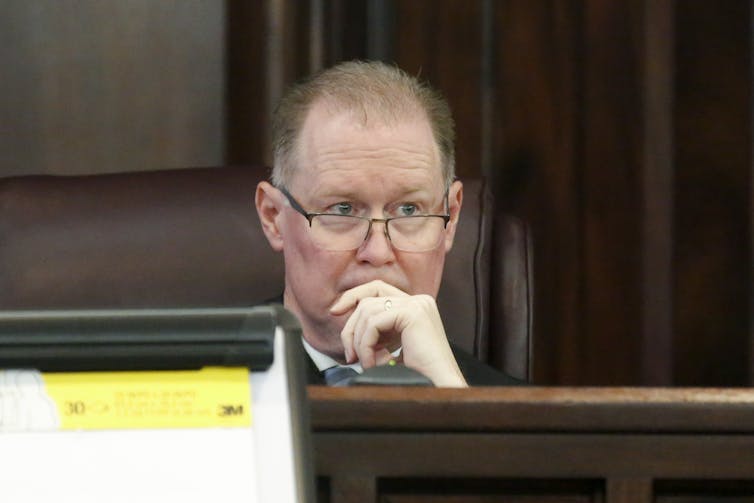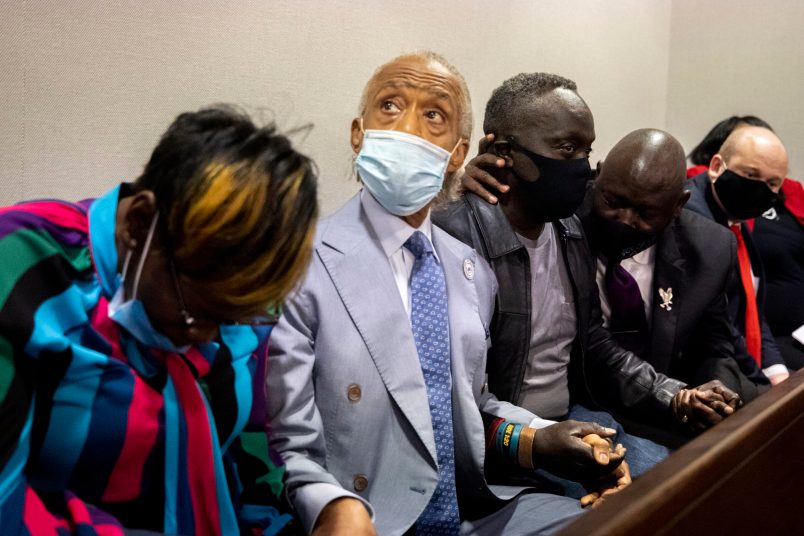This article is part of TPM Cafe, TPM’s home for opinion and news analysis. It first appeared at The Conversation.
The idea of community and who belongs and who does not was a common theme in the Jan. 7, 2022, sentencing hearing of three white men convicted of killing Ahmaud Arbery.
“They chose to target my son because they didn’t want him in their community,” said Arbery’s mother, Wanda Cooper-Jones, during the hearing. “When they couldn’t sufficiently scare him or intimidate him, they killed him.”
Arbery was the 25-year-old unarmed Black man who was shot to death on Feb. 23, 2020, while jogging through a predominantly white, middle-class neighborhood in Brunswick, Georgia. Race went largely unspoken throughout the trial, but the idea of belonging was clearly drawn in black and white.
As a professor of sociology and criminal justice at Clark and Atlanta University, I have witnessed and studied perfunctory Southern ways that are often referred to as Southern “gentility” and Southern “hospitality.” These “Southern” ways of knowing and being get presented as niceties, but they often serve to maintain the racial order of the past.
On their face, these common rituals – like waving to neighbors and strangers – brand the Southerner as gentler and kinder than others, closer to God, and perhaps even more patriotic. As practice, the actions tie people not only to the land, but to a culture.
That culture seems innocuous, innocent and friendly – but it is not. And the death of Ahmaud Arbery is a powerful example of how that gentility can camouflage deadly discrimination.
Racial reckoning
In a nation still reeling from the murder of George Floyd and other violent attacks on people of color, many breathed a momentary sigh of relief after Greg McMichael and his son Travis were sentenced to life in prison without the possibility of parole for Arbery’s murder.
McMichaels’ neighbor William “Roddie” Bryan was given life in prison with the chance of parole. He had filmed the cellphone video as Arbery fell dead in the street. A jury convicted the three in November of last year.
Before sentencing, Judge Timothy Walmsley paused for a minute of silence, which he later explained represented a fraction of the five minutes Arbery spent running from the three white men who chased him in pickup trucks on that Sunday afternoon.
“At a minimum,” Walmsley said, “Ahmaud Arbery’s death should force us to consider expanding our definition of what a neighbor may be and how we treat them. I argue that maybe a neighbor is more than the people who just own property around your house. …”

In a sense, Walmsley was asking those assembled in the courtroom and watching on television to put themselves in Arbery’s running shoes and imagine the sheer shock of discovering that Southern hospitality had a violent reality.
Terms commonly used among Southerners can likewise mean the opposite of how they sound.
Consider the “bless your heart” that is meant as anything but a blessing, and, in fact, is used as a heavy dose of sarcasm. Or the respectful and deferential, “Yes, ma’am,” “No, sir,” or other courtesy titles customarily given to whites and withheld from Blacks, irrespective of their age. W.E.B. Du Bois referred to this last practice as “the public and psychological wage of whiteness.” Du Bois was suggesting that even among low-wage white earners, the racial identity of whiteness paid dividends that people of color could not collect.
Simple Southern practices like waving to strangers are steeped with double meanings that work to preserve a de facto segregation.
Consider: There is an expected action-interaction order present in the deed of speaking or otherwise gesturing to strangers. The salutation itself is a performance of belonging in the space. A specific response is expected. It may be a nod of the head, tip of the hat, raised hand or a simple hello. The routine says, “I know the rules of engagement here, and I accept them. You want me to make you feel comfortable with my presence here, and I am willing to do that.”
Arbery did not engage the men or play the game of deference.
Race and public space
In “How Ingrained Racism Became Invisible,” I explain how place and where people belong and with whom is part of an often unspoken broader U.S. racial structure that positions whites on top and Blacks on the bottom.
In my larger body of research I argue that despite advances by racial and ethnic minorities and other disadvantaged groups, vestiges of this American Jim Crow belief system still operate in society. This racial ideology may be more pronounced in some parts of the nation, like the U.S. South, but my research shows that this racial order is present above, below and across the Mason-Dixon Line.
Kara Cebulko, a sociology and global studies scholar, explains how racial privilege allows whites and those who pass as white to “navigate public space without being stopped, questioned, arrested, detained and/or deported.”
That clearly was not the case with Arbery, who was Black and couldn’t claim that privilege.
Protecting the racial status quo
At sentencing, defense counsel continued to stress that the defendants had good intentions and simply wanted to support their community. In this telling of the story, the defendants were represented as good neighbors – hardworking individuals just looking out for one another. It was painted as the Southern way, and they were simply engaged in Southern hospitality.
But in the journal Study the South, Betsie Garner writes that Southern hospitality uses language and practices whose real purpose is “to exclude minorities and maintain their marginalized status in the community.”
“The politics of belonging in southern communities continues to be determined in large part by the practice of southern hospitality,” Garner says.
If the McMichaels’ and Bryan’s actions that day were to help their community, that community did not include Arbery.
Before his son, Travis, fired the shots that killed Arbery, defendant Greg McMichael told 911 dispatch the reason for his call: “I’m out here at Satilla Shores. There’s a Black male running down the street.”
During cross-examination by the prosecutor at their trial, defendant Travis McMichael explained, “I wouldn’t say [I] ordered [Arbery to stop running], I was asking him … [in order to] keep the situation calm.” But shortly after the murder, the senior McMichael told police, “We had him trapped like a rat.”
Travis McMichael argued he felt threatened by Arbery and feared for his own life until he pulled out his shotgun and shot him.
Ahmaud Arbery’s sister didn’t mince words when she said she believed race – not self-defense – played a role in her brother’s shooting.
“Ahmaud had dark skin that glistened in the sunlight like gold. He had thick, coily hair and he would often like to twist it,” Jasmine Arbery said at the sentencing hearing. “He was tall, with an athletic build. These are the qualities that made these men assume that Ahmaud was a dangerous criminal.”
By all accounts, Arbery was not a dangerous criminal. But in the eyes of three white vigilantes, Arbery was clearly not their neighbor.
Barbara Harris Combs is an associate professor of sociology and criminal justice at Clark Atlanta University.
This article is republished from The Conversation under a Creative Commons license. Read the original article.







I call bullshit.
Fun headline. Co-opted from the Onion?
I’m an older white southerner and it never occurred to me that waving to someone could be construed as expecting them to react in a specific way to signal anything or make me feel any particular way. Sometimes, folks, a wave really is nothing but a wave. I can see if you are looking for another meaning you can find it …in almost anything.
Of course race played a part in the Arbery case but don’t kid yourself, if plays a part up north as well.
Born and raised in the North, from early 1982 to early 1985 I was was working and living in Louisiana and experienced exactly what this article is discussing about the South. My job was an outside auditor (CPA) so I traveled in much of the region.
While I was not very political at the time, what I remembered most was how every White person, to a person man and woman, born in the South all thought Ronald Reagan was screwing them but loved Reagan because “he is screwing Black people worse”.
That is not a direct quote because I never once heard a White Southerner say “Black people”.
That is what I remember most about White people from the South was how much more friendly they were than Whites in the North to Black people when interacting with Black people but then showed their true side, utter irrational hatred, when only White people were in the room.
Maybe things have changed in the last almost 40 years, but then in 1984 it had been over 100 years since the Civil War and the attitudes of those born and raised in the South had not changed.